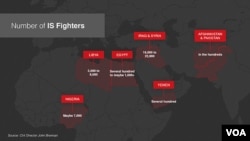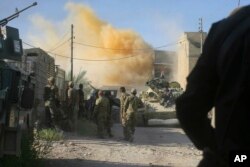Despite losing critical ground in Iraq and Syria, the Islamic State terror group has no intention of slowly fading away, and instead it has been shifting its focus to ensure it remains the world's top terror organization, according to a top U.S. intelligence official.
CIA Director John Brennan painted a bleak picture for lawmakers Thursday on the U.S. Senate Intelligence Committee, warning that even a considerably degraded IS has the resilience, the manpower and the financial resources to strike at enemies both in the Middle East and in the West.
"Our efforts have not reduced the group's terrorism capability and global reach," Brennan said. "As the pressure mounts on ISIL, we judge that it will intensify its global terror campaign to maintain its dominance of the global terrorism agenda."
A key part of that effort will be additional attempts to strike at Western targets in the hopes of replicating the deadly plots that stung Paris and Brussels, as well as inspiring attacks like the shooting in Orlando, Florida, earlier this week.
"ISIL is training and attempting to deploy operatives," Brennan said, using an acronym for the group, and warning that its leadership in Iraq and Syria has a "large cadre of Western fighters" at its disposal for such infiltrations.
Dire warning
The CIA director underscored that even as the U.S. and its allies have managed to crack down on the travel of foreign fighters to join IS in places like Iraq and Syria, there are still plenty of avenues for fighters to return. He said likely options include joining the flow of refugees, taking advantage of smuggling routes and even sending terrorists back to the West using "legitimate methods of travel."
Brennan's stark warning comes even as other U.S. officials have been touting progress against IS, telling VOA the terror group "is at its weakest point" since rapidly advancing across Syria and Iraqi in 2014.
Military officials have also pointed to an IS fighting force visibly on its heels in its self-declared caliphate, having lost 50 percent of the terrain it once held in Iraq and upwards of 20 percent of what it once controlled in Syria.
“There is no way you can look at ISIL today and look at the geographic territory they control, look at their leadership, look at their ability to communicate and judge they are in a better position today then they were a year ago,” Pentagon spokesman Peter Cook told reporters Thursday.
Defense Department officials have also pointed to diminishing financial resources and low morale among the IS ranks, highlighting reports of some IS leaders stealing gold and trying to flee.
IS forces themselves have also been increasingly depleted. Brennan himself told lawmakers the CIA estimates the group is down to 18,000 to 22,000 fighters, slightly lower than other recent estimates and down significantly from an estimated high of 33,000 fighters last year.
"This is an organization that has some very rocky roads ahead despite the adaptations," said Daveed Gartenstein-Ross, a senior fellow at the Foundation for Defense of Democracies who has warned the group "could be looking at a death spiral that will destroy the organization."
Long-term threat
U.S. officials agree the self-declared caliphate is in trouble and that outside of Libya and Egypt’s Sinai Peninsula, IS’ branches have struggled to gain traction.
Yet the Pentagon acknowledges it may not be enough.
“The military effort to defeat ISIL is absolutely necessary but it is not sufficient to deal with this threat in full,” Cook said. “That’s why we want to accelerate our efforts,” he said.
And intelligence officials believe the group has more than enough resources to pose a long-term threat.
"This is a global challenge," said the CIA's Brennan. "The numbers of ISIL fighters now far exceeds what al-Qaida had at its height. We're talking about tens of thousands of individuals."
According to U.S. estimates, often criticized for being too conservative, there could be as many as 40,000 IS fighters and operatives in just Iraq, Syria, Libya, Egypt, Nigeria, Yemen, Afghanistan and Pakistan.
And despite losses in Iraq, Syria and Libya, Brennan warned that the terror organization continues to attract new adherents, with terror groups in Southeast Asia specifically "increasing their interactions and connections with ISIL."
"I don't think strategically they're losing," said Jessica McFate, a former U.S. Army intelligence officer now with the Institute for the Study of War.
"The competition is literally global and literally extending to places where al-Qaida has been trying to penetrate, and ISIS is actually penetrating faster," she said. "ISIS has even more opportunity to demonstrate outsized effects just by starting operations in a new place."
Fertile recruiting grounds
U.S. intelligence officials also worry that continued instability in the Middle East and elsewhere is providing IS, as well as other terror groups, plenty of fertile ground for new recruits.
"More and more individuals, because of their feelings of being disenfranchised from their governments are now identifying with subnational groups, whether it be with an ISIL, or a [Jabhat al] Nusra or Boko Haram or others," said Brennan.
"They're not identifying themselves as Somalis, Nigerians or Yemenis," he said. "They're identifying themselves as part of a confessional group or a terrorist organization. That is a very, very disturbing trend."
VOA's Wayne Lee contributed to this report.







